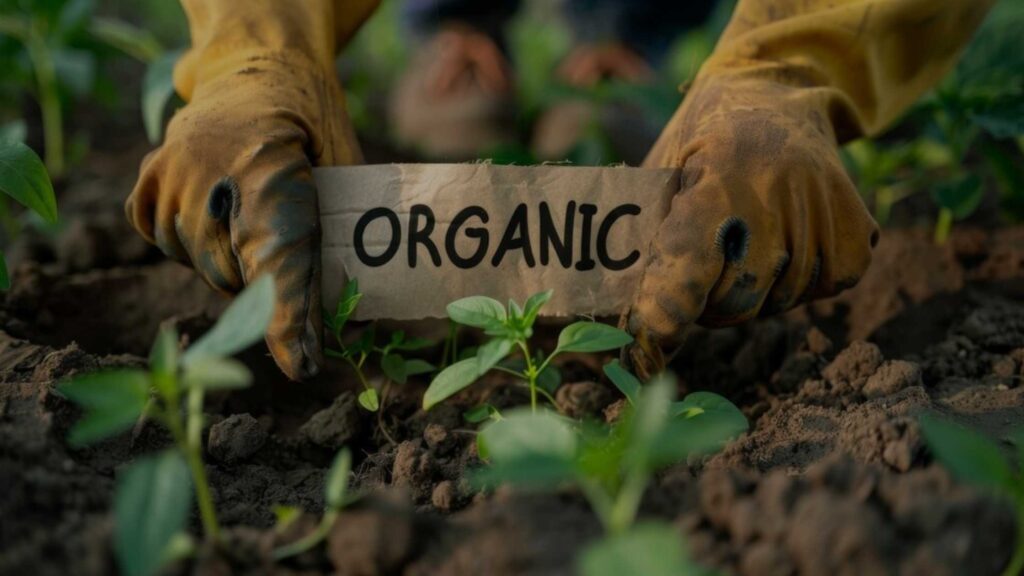Introduction
Adopting sustainable practices in numerous sectors, including agriculture, has become increasingly important in light of the acceleration of climate change and its negative impacts on our world. With its focus on biodiversity, soil health, and ecological balance, organic farming presents a viable option for reducing climate change. In order to better understand the connection between organic farming and climate change, this blog will highlight the ways in which organic methods help to cut greenhouse gas emissions, store carbon, and foster adaptability to environmental challenges.
Understanding Climate Change
Before examining the link between organic farming and climate change, it is essential to understand the seriousness of the current climate issue. The combustion of fossil fuels and deforestation, in particular, have caused a sharp rise in greenhouse gas emissions during the past century, trapping heat within the Earth’s atmosphere. The greenhouse effect, a phenomenon that causes increased temperatures, changing weather patterns, rising sea levels, and ecological damage, is what causes global warming.
Role of Agriculture in Climate Change
Agriculture is both a cause and a sufferer of climate change. Conventional agricultural methods produce a significant amount of greenhouse gas emissions since they mainly rely on synthetic fertilizers, herbicides, and intensive land usage. These emissions come from a variety of sources, such as synthetic nitrogen fertilizers, cattle enteric fermentation, and organic matter decomposition. Deforestation for agricultural development also makes the problem worse by diminishing carbon sinks like wetlands and forests.
Here are various ways in which agriculture is addressing the Challenges and Moving towards Climate-Smart Agriculture –
Sustainable Intensification: Employing sustainable agricultural methods, such as integrated pest management, conservation agriculture, and agroforestry, can increase soil health, lower greenhouse gas emissions, and better manage water and nutrients.
Precision farming: By utilizing tools like remote sensing, GPS, and data analytics, agricultural operations may maximize inputs, cut down on waste, and utilize resources more effectively.
Agroecology and Organic Farming: Using agroecological and organic farming methods may increase soil health, boost biodiversity, and minimize dependency on synthetic inputs, which will ultimately cut greenhouse gas emissions.
Climate-resilient crop varieties: Crop varieties that are climate-resilient are being created and promoted in an effort to assist farmers cope with the problems posed by climatic change.
Policy Support and Research: Governments and international organizations must promote research and development in sustainable agriculture practices, climate change adaption, and mitigation methods through legislation, incentives, and finance.
The Promise of Organic Farming
Both a cause of and a sufferer of climate change, agriculture. Conventional agricultural methods produce a significant amount of greenhouse gas emissions since they mainly rely on synthetic fertilizers, herbicides, and intensive land usage. These emissions come from a variety of sources, such as synthetic nitrogen fertilizers, cattle enteric fermentation, and organic matter decomposition. Deforestation for agricultural development also makes the problem worse by diminishing carbon sinks like wetlands and forests.
Carbon Sequestration and Organic Farming
The potential of organic farming to store carbon in the soil is one of its key advantages. Strong carbon sinks, which are capable of storing carbon dioxide from the atmosphere, are healthy soils rich in organic matter. Applying compost and using cover crops, among other organic techniques, encourage soil carbon sequestration. A further benefit of not using synthetic fertilizers is that no nitrous oxide, a strong greenhouse pollutant, is released. According to studies, organic farming has a considerable capacity to store carbon, which may be used to offset emissions and slow down climate change.
Preserving Biodiversity and Ecosystem Resilience
Organic farming plays a crucial role in climate change mitigation by prominently stressing conserving biodiversity. It avoids the use of chemical pesticides and embraces practices such as crop rotation, through which it promotes environmental health. Moreover, the usage of natural resources in organic farms provides habitat and shelter for beneficial organisms, insects, birds, and wildlife.
Organic farming forms a dynamic farm ecosystem and nurtures biodiversity, which supports practices such as pollination, pest control, and nutrient cycling. This contributes to the overall resilience of the farm ecosystem. Moreover, diversified organic systems are often better equipped to withstand the impacts of climate change, including extreme weather events and pests.
The Importance of Regenerative Organic Agriculture
Regenerative organic agriculture takes organic farming a step further by actively restoring and enhancing ecosystem services. This holistic approach focuses on building soil health, improving water management, and enhancing biodiversity. Through practices such as agroforestry, conservation tillage, and water-efficient irrigation systems, regenerative organic agriculture fosters resilience and offers long-term sustainability. By integrating regenerative practices into farming systems, we can enhance climate change mitigation efforts while promoting food security and rural livelihoods.
Policy Support and Consumer Demand
Supportive policies started by the Government and international organizations contribute a lot to promoting organic farming. They should support the transition of organic farming through financial assistance, research funding, and the development of sustainable agricultural policies. Along with that, consumer choices also make a significant contribution by enhancing the demand for organic products. These two aspects play a vital role in fully harnessing the potential of organic farming for climate change mitigation.
Conclusion
In conclusion, Organic farming cultivates an effective pathway to address the concerned challenges of climate change and sustainable agriculture. Organic farming promotes resilience in facing climate-related disruptions and mitigates greenhouse gas emissions by prioritizing soil health, biodiversity, and regenerative practices. Overall, It works as a savior system for our environment, or ecology.
However, Governments and institutions are making policies and efforts to promote organic farming among people, farmers, and consumers so that its full potential can be realized. These collaborative efforts can definitely make organic farming resilient toward mitigating climate change. We can create a sustainable and climate-resilient future by making organic farming the foundation of our food systems.

